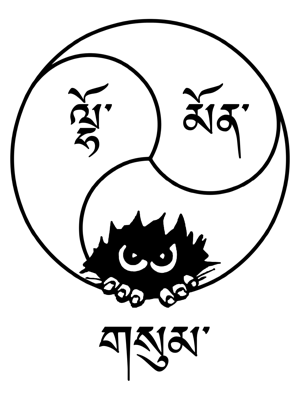Bête noire - the Tsong

It's a particularity of human visual perception that we often look at things, day in, day out, without realizing what we see. Every Sikkimese worth that exclusive title will, off and on, have a look at the flag of the erstwhile kingdom. He or she may notice the dominant Choekhor (Dharmachakra) and the shining red borders. But many, it seems, do not recognize the innermost testimony of the age-old imagery.
There, at the very core of the flag - hinting at the very core of Sikkimese identity, likewise - one can make out a Gakhyil (threefold swirl) symbolizing trinity, wholeness attained through the unity of three. As for Sikkim, these three are the Lhopo, the Monpa, and the Tsong as documented in the Lho-Mon-Tsong-Sum agreement of 16631 or, in modernspeak, the Bhutia, the Lepcha, and the Limboo.
No euphemistic platitudes! Their mutual allegiance was a mixed bag throughout history. Initially, they shared power and responsibility in a fairly just way based on clearly defined rights and assignments. Later on, however, the sliders of influence moved to the advantage of the fortunate ones ... and to the detriment of the others, though there are convincing indicators that these adjustments were the consequence of loyalty rather than ethnicity. Anyway, up to 1974, Bhutia, Lepcha and Limboo held, each, a warranted share in political power - presumed to be safeguarded by the Indian Constitution.
In the few decades being tied to the apron strings of Mother India, we've learnt at least one lesson: Things don't always turn out as expected ... or promised. The ink on the agreement with India had hardly dried when the safeguards turned out to be neither safe nor guards. The reserved assembly seats of the Bhutia and Lepcha were reduced, unilaterally, while the seat of the Limboo was done away with once and for all. Henceforth, they were assigned to the pool of the Nepalese Sikkimese and, to my knowledge, the Limboo did virtually little to correct the enacted affiliation and hardly ever complained NOT to be Nepalese.
Things changed when the Government of India decreed, in 2003, what had been commonplace in Sikkim for a few centuries: The Limboo are an indigenous community of Sikkim, hence of India, and deserve inclusion in the list of Scheduled Tribes. Which, again, implies they are entitled to reserved seats in the legislative assembly. Clubbed with the Tamang, this time, their generally accepted quota adds up to roughly five reserved seats. So far, so good.
If only the implementation - or rather the lack thereof - dragging on for meanwhile 19 years were not that painful to watch! The matter is dealt with by the law of the jungle - 'big beast eat little beast', and divide and rule is being exercised in ultimate perfection!
Campaigners giving boastful promises, elects not giving a damn about their promises, bystanders trying to seize the opportunity to their own gain, Bhutia and Lepcha fearful of being curtailed again, a verdict of the Supreme Court met with outrageous disobedience, a never ending sequence of recriminations, contradicting statements, as well as shelving or shifting files to and fro in the extended labyrinth of Indian bureaucracy sum up to the bitter finding:
The Limboo - and their Tamang team mates - are being cheated disgracefully. They have been the bête noire2 of a number of consecutive administrations ... including the one whose slogans promised change, the underdog anyone can dupe, stall and mislead without being held accountable. Shamefaced, one must admit that even many of their confederates of the primal coalition keep a low profile, don't speak up for their allies, fail to act in solidarity according to the ancient oath.
All the autochthons of Sikkim got in exchange for a kingdom was a number of contractually 'guaranteed' privileges in a political system embossed and bossed by alien powers and individuals. It's about time to unite in order to keep what little has been left over! Sikkim will hardly find peace as long as the triune core is rotting on.
By the way, designation of five reserved seats for the Limboo and Tamang, and be it only with an interim arrangement until 2026, is no daring feat. The two communities already DO have five seats in the Sikkim Legislative Assembly. To acknowledge the established realities and the legal entitlement is everything left to do! No one in their right mind would challenge the one or the other.
Chopel Serkhangpa, 3rd January 2022
1 The Lho Mon Tsong Sum Agreement, translation by Saul Mullard, 2009
2 French for 'black beast', meaning something or somebody strongly detested or avoided, an object of aversion, or the bane of one's existence.
